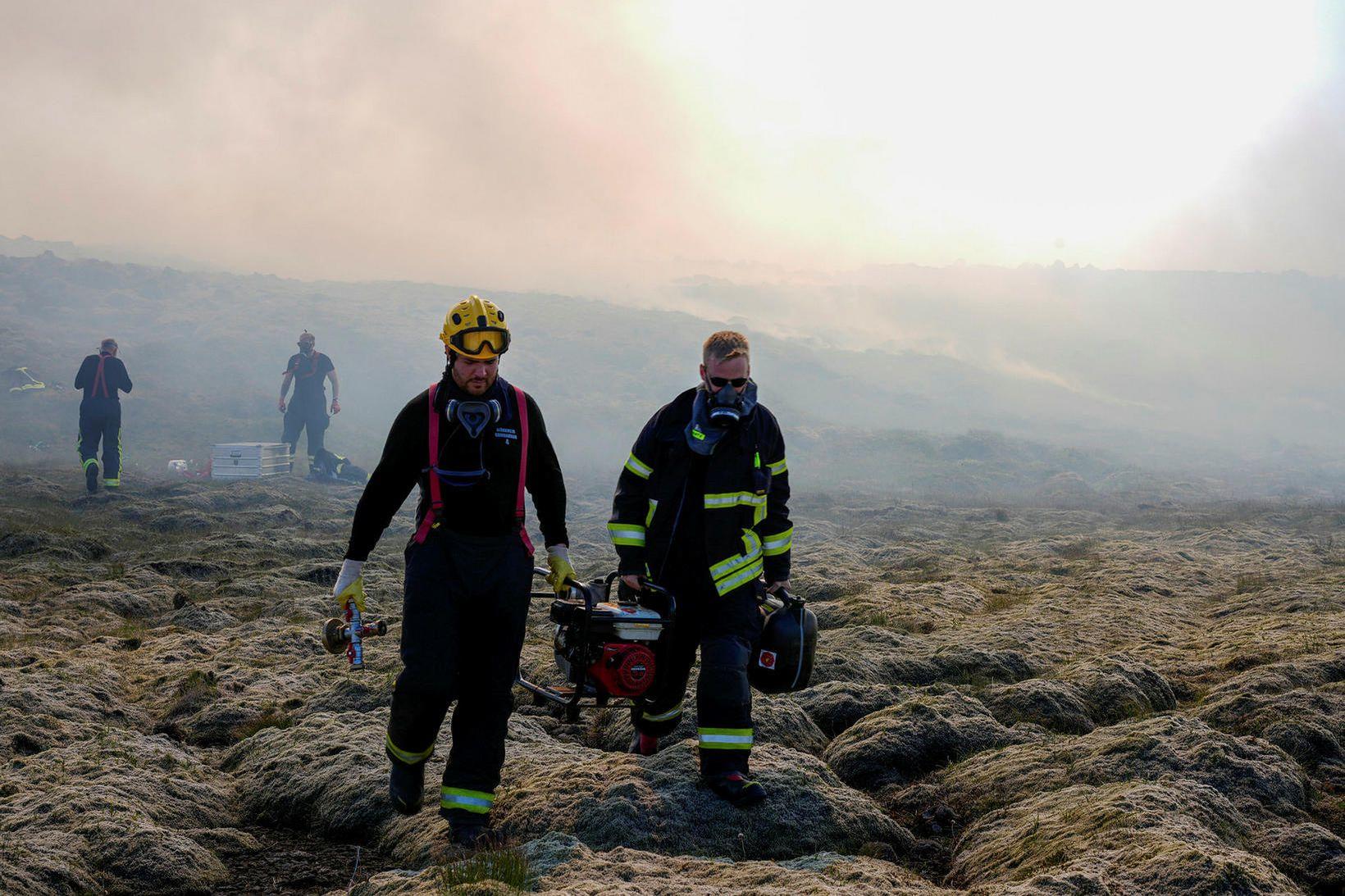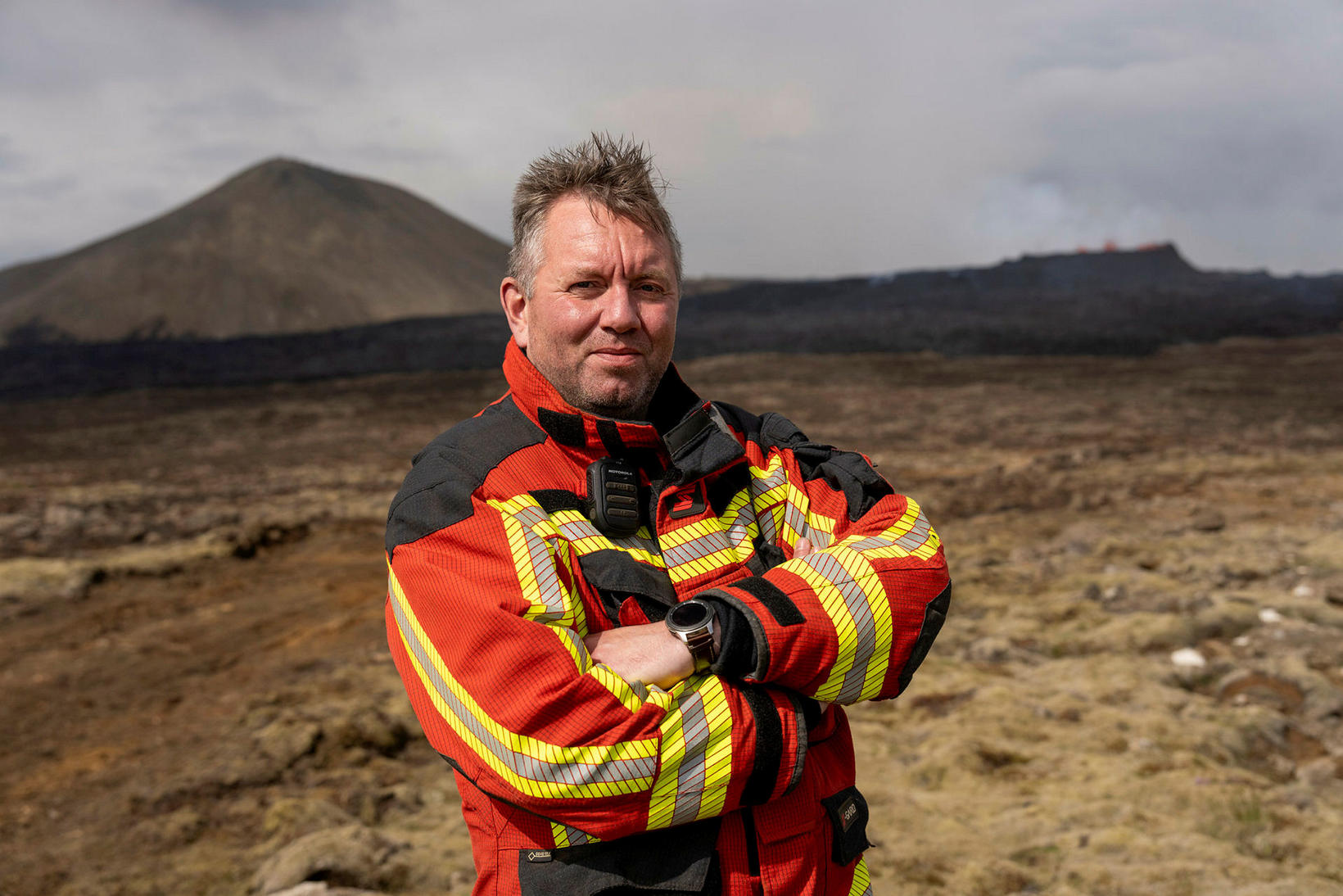Understands that many are afraid
Einar Sveinn Jónsson, the fire chief in Grindavík, says that the equipment has been renewed so his team is better equipped to deal with wildfires in case of a volcanic eruption than last summer by Litli-Hrútur. mbl.is/Hákon
“We are naturally in the uncertainty level of civil protection, and the uncertain phase involves closely monitoring, informing and reviewing all ongoing plans and programmes, and then we trust the scientific community to assess the risks, we are not experts in that.”
This is what Einar Sveinn Jónsson, fire chief in Grindavík, says when asked by mbl.is if he is worried about the situation after the earthquakes in recent days on the Reykjanes peninsula.
According to a notice from the Icelandic Met Office, the situation could change rapidly and it cannot be excluded that magma could break its way into the crust northwest of the mountain Þorbjörn.
The earthquakes can be felt more now
When asked what needs to happen so Grindavík will be evacuated, Jónsson says that he is not really seeing that situation coming but if it did, the evacuation would be the responsibility of the police commissioner.
“There would have to be a lot of activity and looming danger to take action. Even if there’s an eruption above Þorbjörn mountain, it’s a long way from the original town. The uncertainty level of civil protection shouldn’t affect daily work, either, everyone is just on the lookout and watching and monitoring the district, and at the moment it doesn’t have any more impact. Everyone’s just doing their job.”
Furthermore, Jónsson notes that in the wake of the last eruption, the townpeople experienced few earthquakes but now the situation is different.
“Then Grindavík got out of the quakes very lightly, there have been more tremors now and it’s uncomfortable. Seismic swarms are uncomfortable so people worry about what might happen, but this is such an event that it’s not something that people have to run away from. This is a long-term event and it happens very slowly. But I understand and have full respect for the fact that there are many people afraid of this,” he says.
“If one route closes, another will open”
According to Jónsson, all kinds of scenarios have been drawn up and thinking about what happens if Grindavík road goes under lava.
“There are more naturally accessible routes in and out of town than Grindavík’s road. We have Nesvegur road and Suðurstrandarvegur road, and lots of other trails there. If one route closes, another one will open, and this is just a project we will face if we have to, and don’t have to be screaming or running. Lava moves very slowly forward, so if this starts, it’s will take days, although we hope, of course, that won’t happen.”
Necessary to tell the truth
When asked whether a draft of a defence plan has been drawn up, he says that there are plans for it, although it is difficult to locate something when it is not known beforehand where the event will take place.
“There are plans for that, construction and so on,” he says, and the journalist is curious to know if being a firefighter is stressful in such a time.
“No, we try to do our best and do the best job we can. We just stand together as townpeople of Grindavík, all as one. It’s important not to create some kind of fear, rather to be informed and not to be hiding anything, and always say the truth.”
He adds that it is important not to hype the situation so people will be more afraid.
“These events happen very slowly in real-time. This is not an American film where there’s a bomb. It’s more like a oatmeal that boils up from a pot, the ground is torn down, and it rolls up like a oatmeal in the beginning. I would be in some other job if this did not cause me to sleep at night. I sleep well, but we respect nature and we’ll inform more and in the case of disaster, we’ll just take it together. Hopefully, it’ll just calm down and it’ll pass.”
Different situation now
In July, an interview with Jónsson was published in the newspaper Morgunbladid where he described how the fire department’s equipment had been damaged and hoses had both been destroyed and burned after the struggle with wildfires at the eruption site at Litli-Hrútur. He said at the time that there was a need to buy some new equipment.
But has the equipment been renewed and is the fire department equipped to deal with wildfires if they occur?
“We’ve fixed it and we’re in a better situation with the equipment today. The soil is also different now that it’s autumn and everything is wet, so the amount doesn’t depend on it, it’s different and even better conditions,” he concludes.



/frimg/1/60/10/1601046.jpg)





